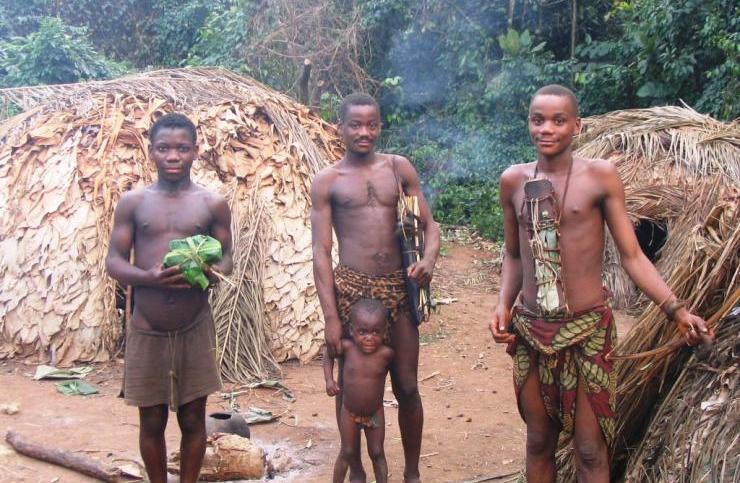Pygmies, the last caretakers of the forest.

Indeed, the Pygmies have always been the caretakers of the forest, truly forest advocates.
Messok Dja, an area of Congo rainforest especially rich in biodiversity, is the ancestral land of the Baka people who have managed the forest since time immemorial. The Baka are one of the many Pygmy groups living in the forest spreading from the Congo Nile Mountains to the Atlantic Ocean. They are called the African Pygmies, the African rainforest hunter-gatherers or Forest People of Central Africa. Scientists roughly identify them in three main geographic groups: the western Bambenga, the eastern Bambuti, and the central and southern Batwa.
That of the Pygmies is a fascinating world. They live by hunting and fishing, they are semi-nomadic gatherers. They have always lived in their own world and happy to be there. Modernity arrived and contaminated, tore up their traditions. The Bantu treat them as pariahs; exploit them like beasts, without any rights or dignity. Now modernity diseases, viruses and bacteria from the outside world that their elders did not know haunt their life.
Red earth tracks enter the rainforest almost with arrogance, the same arrogance of the villagers towards the Pygmy population, increasingly harassed, discriminated and despised throughout the countries. Yet, according to UNESCO, the Aka – also called Bayaka – and all other Pygmy groups are the earliest inhabitants of the rainforest spreading in almost eight countries from the Congo Nile Mountains to the Atlantic Ocean. Yet Pygmies are the poorest of the poor in these least developed countries.
While pretending to establish a conservation zone on their land without their consent the World Wide Fund for Nature (WWF) threatens the Baka. Park rangers commit violent atrocities against them, assaulting, robbing and murdering people in the name of “nature conservation.” There are armed rangers patrolling the area even though the park is not yet established. WWF has been aware of this for many years but has done little to tackle the problem. Actually, logging and palm oil corporations, among others, fund the WWF’s project.
The devastating results of a major investigation just released, document grave human rights violations and atrocities taking place against the indigenous Batwa people in Kahuzi-Biega National Park (PNKB), eastern Democratic Republic of the Congo (DRC). The report by London-based Minority Rights Group (MRG), released on 06 April 2022, shows that Park authorities have engaged in a three-year program of violent forced expulsions (Read the report here).
The pygmies have an intimate connection to their land, where they have lived since time immemorial. They also rely on the forest for medicine, food, and shelter and have their own sophisticated codes of conservation. The forest is their life. Taking the forest from them means stopping them from feeding themselves. They are going to die. Therefore, they are instinctively the caretakers of the forest not because there were the good savages imagined by J.J. Rousseau but because protecting the forest they advocate for themselves.
A pygmy pointed it out to an Okapi Wildlife Reserve’s ranger of the Ituri Forest. The ranger was forbidding him to hunt there “because you are going to kill Okapi for meat.” The pygmy answered, “Not at all, the Okapi’s meat is not good, we eat monkeys.”
Actually, who attacked the rangers on Friday 14 July 2017 killing four of them because they were preventing the hunting in the park was an armed local rebel group, not the Pygmies.
International law says that any projects taking place on tribal land can only go ahead with the agreement of the people whose land it is. The Messok Dja project has broken this law, as did Okapi Wildlife Reserve: these projects did not secure the free, prior and informed consent of the local communities before they started the process of creating the park. The forest is now off limits to the Baka tribe as it is to the Bambuti group. If they try to go there, the rangers stop them.
Like the indigenous people in the Amazonian Forest, the Pygmies are the African forest’s best caretakers. In Latin America, REPAM (Pan-Amazonian Ecclesial Network, in Spanish acronym) was set up in 2014 answering to the concerns of Pope Francis and the Latin American Church regarding the “deep wounds that Amazonia and its peoples bear”. It embodies Pope Francis’ “a whole-hearted option for the defense of life, the defense of the earth and the defense of cultures.” REPAM efforts produced a main event the Amazonian Synod.
In March 2015, the Episcopal Conferences of Africa and Madagascar (SECAM) launched REBAC (Ecclesial Network for the Congo River Basin), whose mission is to bring each inhabitant of the Congo Basin, especially young people, to appropriate the issues of the environment and climate change, as well as the vision of REBAC.
This vision and hope is that “north-south, indigenous peoples and local communities, present and future generations have access to a life of better quality through responsible and sustainable management of natural resources and especially energy, fisheries, biological, forest and animal resources available. We advocate, and hope, and will advocate that REBAC, as does REPAM for indigenous people, will take special attention to the Central African Pygmies.
John Paul Pezzi, mccj



